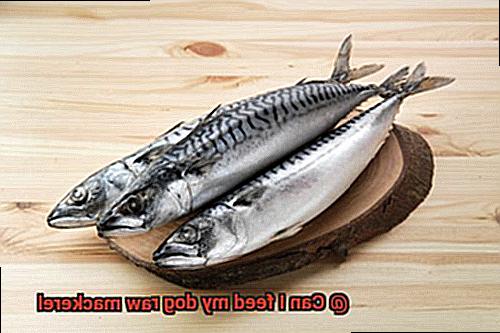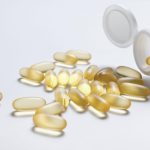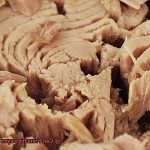Can I feed my dog raw mackerel?
We all know how important it is to keep our furry buddies happy and healthy. And when it comes to their diet, we want nothing but the best, right? Well, that’s where the raw mackerel debate comes in. Some say it’s a superfood for our four-legged pals, jam-packed with omega-3s, vitamins, and minerals.
Others warn about potential risks of feeding raw fish to dogs.
In this blog post, we’ll unravel the mystery and weigh the pros and cons of serving up some raw mackerel for your pup. So let’s dive into this fishy topic together and make an educated decision for our fur babies.
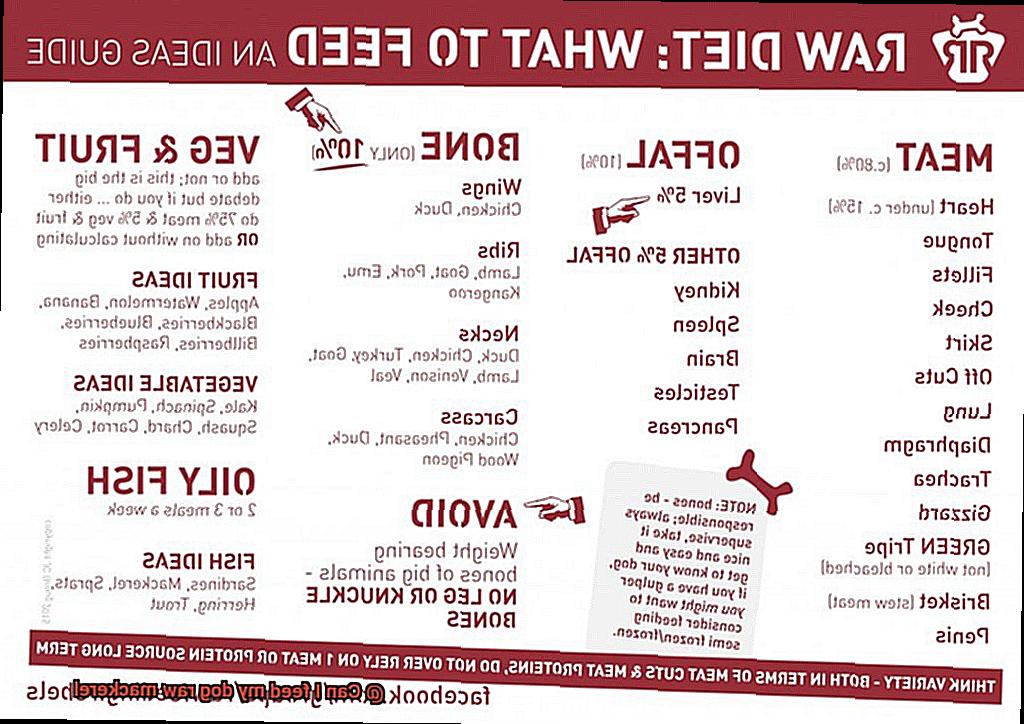
Should I Feed My French Bulldog Raw Mackerel?
Contents
- 1 Should I Feed My French Bulldog Raw Mackerel?
- 2 Considerations Before Introducing Raw Mackerel into Your Dog’s Diet
- 3 How to Safely Source High-Quality, Fresh Mackerel
- 4 Tips for Introducing Raw Mackerel into Your Dog’s Diet
- 5 Preparing Raw Mackerel for Dogs – Bones and Cleaning
- 6 Potential Side Effects of Feeding Your Dog Raw Mackerel
- 7 Other Nutrients Needed in a Balanced Diet for Dogs
- 8 Conclusion
French Bulldogs are beloved pets known for their charm and affectionate nature. As a responsible owner, it’s essential to provide them with a balanced and nutritious diet. One question that often arises is whether it is safe to feed a French Bulldog raw mackerel. In this comprehensive guide, we will explore the pros and cons of feeding raw mackerel to your furry companion to help you make an informed decision.
The Benefits of Raw Mackerel for French Bulldogs:
Raw mackerel offers several potential benefits for French Bulldogs:

- Rich in Omega-3 Fatty Acids: Mackerel is abundant in omega-3 fatty acids, which can promote healthy skin and coat, reduce inflammation, and support heart health in dogs.
- High in Protein: Protein is essential for muscle development and repair, and mackerel provides a good source of high-quality protein.
- Vitamins and Minerals: Mackerel is packed with vitamins D and B12, as well as minerals like selenium and phosphorus, which are vital for overall health.
Considerations and Risks:
While raw mackerel can be beneficial, there are some considerations and risks to keep in mind:
- Quality and Freshness: It is crucial to ensure that the mackerel you feed your French Bulldog is fresh and of high quality. Look for reputable sources or consult with your veterinarian for guidance.
- Potential Presence of Parasites: Fish, including mackerel, can contain parasites such as roundworms or tapeworms. Freezing the fish at the proper temperature can help eliminate most parasites.
- Bacterial Contamination: Improper handling or storage of raw fish can lead to bacterial contamination, such as Salmonella or Listeria, which can cause food poisoning in dogs. Always handle raw fish with caution.
- Nutritional Imbalances: Mackerel should only be a part of a well-balanced diet for your French Bulldog. A diet solely based on one type of food can lead to nutritional imbalances and deficiencies over time.
Consulting with a Veterinarian:
Before introducing raw mackerel into your French Bulldog’s diet, it is crucial to consult with a veterinarian. They can assess your dog’s specific dietary needs, provide guidance on portion sizes and frequency of feeding mackerel, and recommend alternative sources of omega-3 fatty acids if necessary.
Considerations Before Introducing Raw Mackerel into Your Dog’s Diet
If you’re looking to give your furry friend a tasty and nutritious treat, why not consider introducing raw mackerel into their diet? Before you cast your line and reel in this fishy feast, there are a few important considerations to keep in mind. So grab a cup of tea and let’s dive right in.
- Nutritional Benefits: Raw mackerel is packed with omega-3 fatty acids that can do wonders for your Frenchie’s coat, reducing inflammation, and even boosting brain function. It’s like a superfood straight from the sea. Plus, mackerel is loaded with essential vitamins and minerals like vitamin D, vitamin B12, selenium, and potassium – a real nutritional powerhouse.
- Hooked on Risks: While raw mackerel offers numerous health benefits, it’s essential to be aware of the potential risks lurking beneath the scales. Parasites like roundworms or tapeworms can hitch a ride on raw fish and cause trouble for your four-legged mate. Additionally, bacteria like Salmonella or Listeria may also be lurking, ready to spoil the fun with food poisoning.
- Quality Check: Just like you wouldn’t want to eat a rotten apple, your Frenchie deserves the freshest catch too. Make sure to source high-quality mackerel that has been properly handled and stored. Look for previously frozen fish as freezing helps eliminate parasites. Remember, fresher is better.
- Allergy Alert: Just like humans, dogs can have allergies or sensitivities to certain foods – fish included. Before introducing raw mackerel into your Frenchie’s diet, consult your veterinarian and consider an allergy test if needed. Better safe than sorry.
- Reeling in the Right Amount: Moderation is key when it comes to feeding your French Bulldog raw mackerel. Too much fish can upset their delicate tummies and cause nutrient imbalances. To avoid any bellyaches, consult a veterinarian or a canine nutritionist to determine the paw-fect portion size for your furry mate.
- Handling with Care: When preparing this fishy delight, proper handling is essential to keep everyone healthy and happy. Clean your hands, utensils, and surfaces thoroughly before and after handling raw fish. Keep raw fish separate from other ingredients and cooked food to avoid cross-contamination. If you’re feeling a bit unsure about preparing raw fish yourself, consider buying commercially prepared raw dog food that includes mackerel – easy peasy.
How to Safely Source High-Quality, Fresh Mackerel
The quality of the mackerel you choose can greatly impact your dog’s health and well-being. In this article, we’ll explore the importance of sourcing fresh mackerel and provide helpful tips to ensure you find the best options for your beloved pooch.
The Importance of High-Quality Mackerel:
When it comes to your furry friend’s health, quality matters. Fresh mackerel provides essential nutrients like omega-3 fatty acids, protein, and vitamins that can promote healthy skin, a shiny coat, and a robust immune system. By sourcing high-quality mackerel, you ensure that your dog receives safe and nutritious meals.
Risks of Low-Quality Fish:
Feeding your dog raw fish that is not fresh or of poor quality can pose risks. Low-quality mackerel may contain harmful bacteria or parasites that can lead to digestive issues or illness in your pet. It’s important to source from reputable suppliers who prioritize stringent quality control measures.
Finding Reputable Suppliers:
To ensure the freshness and quality of mackerel, seek out trusted fishmongers or grocery stores with a reputation for excellence. Ask questions about the origin of the fish, their handling practices, and whether it has been previously frozen. Avoid purchasing from unknown sources or street vendors to minimize potential contamination risks.
Identifying Fresh Mackerel:
Fresh mackerel exhibits specific characteristics. Look for bright eyes, firm flesh, and a mild oceanic smell when selecting fish. Dull eyes, discolored skin, or a strong odor are signs of fish that may not be fresh.
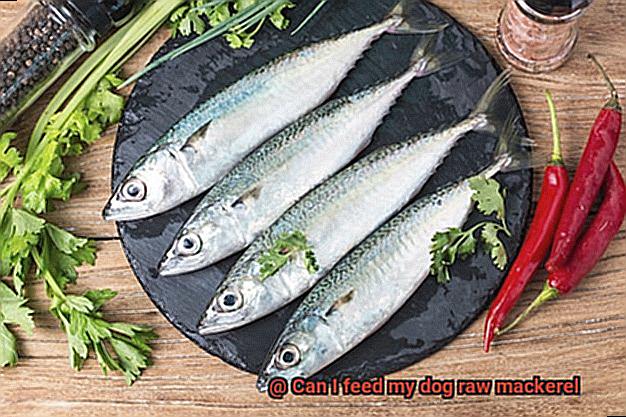
Considering Frozen Mackerel:
If fresh mackerel is not readily available, frozen options can be a reliable alternative. Choose reputable brands or suppliers who follow proper freezing protocols to maintain quality and reduce the risk of bacterial contamination. Freezing can preserve the freshness of mackerel and ensure its availability when needed.
Storing and Handling Mackerel:
To maintain the freshness of mackerel, proper storage is essential. Keep it refrigerated in airtight containers or wrap it tightly in plastic wrap before placing it in the refrigerator. Consider purchasing smaller quantities more frequently to prevent spoilage and ensure freshness for your furry friend.
Tips for Introducing Raw Mackerel into Your Dog’s Diet
If you’re considering adding raw mackerel to your French Bulldog’s diet, you’re in for a treat. Raw mackerel is not only delicious but also packed with essential nutrients that can benefit your furry friend’s overall health. However, it’s important to introduce this fish gradually and with caution to ensure a smooth transition. In this article, we’ll provide you with some helpful tips and insights on how to safely incorporate raw mackerel into your French Bulldog’s meals.
Start small and slow:
When introducing any new food into your dog’s diet, it’s crucial to start with small portions. Begin by offering a small piece of raw mackerel as a treat or mix it with your dog’s regular food. This gradual introduction allows your dog’s digestive system to adjust to the new protein source without causing any digestive upsets.
Freshness is key:
Before feeding raw mackerel to your French Bulldog, make sure it is fresh and of high quality. Look for shiny skin, clear eyes, and a fresh smell. Avoid any signs of discoloration or a strong fishy odor, as these may indicate spoilage.
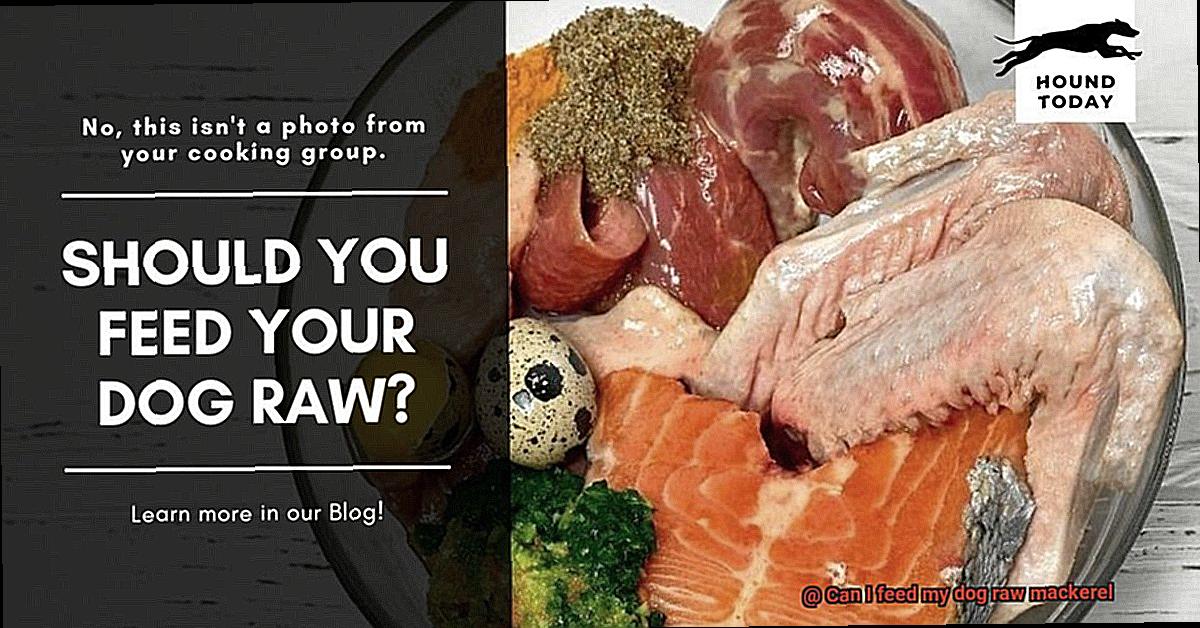
Freeze for safety:
To eliminate any potential parasites or harmful bacteria, it is recommended to freeze the raw mackerel for at least two weeks before feeding it to your dog. Thaw the fish thoroughly before offering it as a meal or treat.
Remove bones:
Mackerel contains small bones that can pose a choking hazard or cause gastrointestinal issues if ingested. Therefore, it is crucial to carefully remove all bones before feeding raw mackerel to your French Bulldog. This step ensures their safety and makes digestion easier.
Balance is key:
While raw mackerel provides valuable nutrients like omega-3 fatty acids and protein, it should not be the sole component of your French Bulldog’s diet. It’s important to offer a balanced diet that includes other protein sources, carbohydrates, and vegetables. Consult with your veterinarian or a canine nutritionist to determine the appropriate portion sizes and overall balance of your dog’s meals.
Preparing Raw Mackerel for Dogs – Bones and Cleaning
Well, look no further than raw mackerel. Not only is it tasty and nutritious, but it’s also a great way to give your furry friend some omega-3 fatty acids for a healthy coat and skin. But before you start tossing mackerel to your pup like it’s going out of style, let’s talk about the proper way to prepare this delicious treat.
First things first, we need to address the issue of bones. Now, I know what you’re thinking – bones? Isn’t that dangerous for dogs? Well, fear not. Mackerel has small and soft bones that are actually safe for your pup to consume. However, it’s always better to err on the side of caution. So, grab a sharp knife and fillet that fish like a pro. Remove the backbone and ribs, ensuring that no pesky bones are left behind. Alternatively, you can always purchase boneless mackerel fillets from a reputable source. It’s all about keeping your pooch safe and sound.
Now that we’ve got the bones out of the way, it’s time for a little cleaning session. Rinse off the mackerel under some cool running water and give it a gentle rub to get rid of any dirt or debris. Some folks even like to soak the fish in a mixture of water and vinegar for a few minutes to give it an extra disinfecting boost. Your pup will thank you for it.
Once your mackerel is all cleaned up and ready to go, you can serve it raw to your doggie delight. Just keep in mind that some dogs may have sensitivities or allergies to certain types of fish, so it’s important to introduce new foods gradually. And always keep an eye out for any signs of digestive upset or allergic reactions. Your pup’s health and happiness are our top priorities.
Now, I know what you’re thinking – can my French Bulldog survive on a diet of just mackerel? Well, as much as your furry friend might love that idea, it’s important to maintain a balanced overall diet. Dogs need a variety of proteins, vegetables, fruits, and other essential nutrients to thrive. So, consult with a veterinarian or a canine nutritionist to determine the appropriate amount of raw mackerel to include in your dog’s diet.
Potential Side Effects of Feeding Your Dog Raw Mackerel
Feeding your French Bulldog raw mackerel can provide several health benefits, but it’s important to be aware of potential side effects. Understanding these risks is crucial before incorporating raw mackerel into your dog’s diet. Let’s dive into the potential side effects you should know about.
Foodborne Illness
Raw mackerel, like any raw fish, carries a risk of foodborne illnesses such as salmonella or listeria. These bacteria can cause gastrointestinal issues in dogs, including vomiting, diarrhea, and stomach pain. It’s essential to handle and store raw mackerel properly to minimize the risk of contamination. Dogs with weakened immune systems or underlying health conditions may be more susceptible to these infections.
Thiamine Deficiency
Raw mackerel contains an enzyme called thiaminase, which breaks down thiamine (vitamin B1). Ingesting excessive amounts of thiaminase can lead to a thiamine deficiency in dogs. Thiamine is essential for proper nerve and muscle functioning. Symptoms of thiamine deficiency in dogs include loss of appetite, seizures, and neurological abnormalities. To prevent this deficiency, it’s important to ensure a balanced diet that includes other sources of thiamine.
Mercury Contamination
Mackerel is a type of fish that can contain high levels of mercury due to environmental pollution. Mercury is a toxic heavy metal that can accumulate in an animal’s body over time. Dogs who consume mackerel with high mercury levels are at risk of mercury poisoning. This can affect their nervous system, leading to symptoms such as tremors, difficulty walking, and even organ damage. To minimize the risk, choose low-mercury fish options or limit mackerel intake.
Allergic Reactions
While mackerel is not a common allergen for dogs, there is still a possibility of an allergic reaction occurring. Dogs, like humans, can develop allergies to certain foods. Common symptoms of food allergies in dogs include itching, skin rashes, and gastrointestinal upset. Monitor your French Bulldog closely for any signs of an allergic reaction when introducing raw mackerel into their diet.
Nutritional Imbalances
Although mackerel is rich in omega-3 fatty acids and other nutrients, relying solely on it as the main source of nutrition may lead to imbalances in your dog’s diet. A well-rounded and balanced diet is essential for their overall health. Ensure that your French Bulldog’s diet includes other protein sources, carbohydrates, and essential vitamins and minerals to prevent deficiencies.
Other Nutrients Needed in a Balanced Diet for Dogs
Just like us humans, dogs need fiber in their diet to maintain healthy digestion and regulate bowel movements. Fiber can be found in fruits, vegetables, and whole grains. It adds bulk to the stool, making it easier for your French Bulldog to pass waste. Additionally, fiber helps prevent constipation and can aid in weight management by providing a feeling of fullness.
Omega-3 Fatty Acids: A Coat of Arms for Your Bulldog
Omega-3 fatty acids are essential for promoting a healthy coat and skin in French Bulldogs. These fatty acids also have anti-inflammatory properties and support brain function. Sources of omega-3 fatty acids include fish oil, flaxseed, and chia seeds. Adding these to your Bulldog’s diet can help keep their coat shiny and their skin moisturized.
Antioxidants: Shielding Your Bulldog’s Health
Antioxidants play a crucial role in protecting cells from damage and supporting the immune system. Foods rich in antioxidants include berries, leafy greens, and herbs like turmeric. Including these antioxidant-rich foods in your French Bulldog’s diet can help prevent cell damage and support their overall health.
Probiotics: Cultivating a Healthy Gut Flora
Probiotics are beneficial bacteria that promote a healthy gut flora in dogs. They aid in digestion and can improve the absorption of nutrients. Probiotics can be found in yogurt, kefir, and certain supplements. Adding probiotics to your Bulldog’s diet can help maintain a healthy digestive system.
Calcium and Phosphorus: Building Strong Bones and Teeth
To maintain strong bones and teeth, French Bulldogs require adequate amounts of calcium and phosphorus in their diet. These minerals can be obtained from dairy products, leafy greens, and bone meal supplements. Ensuring your Bulldog gets enough calcium and phosphorus will help support their skeletal health.
Water: The Unsung Hero
Last but certainly not least, water is often overlooked but is vital for a dog’s overall health. It is essential to ensure that your French Bulldog has access to fresh and clean water at all times. Water helps with digestion, regulates body temperature, and keeps your Bulldog hydrated.
Conclusion
In conclusion, it is safe and beneficial to feed your dog raw mackerel.
This nutrient-rich fish provides a plethora of health benefits for your furry friend. With its high omega-3 fatty acid content, mackerel promotes a healthy coat, reduces inflammation, and supports brain function.
Additionally, the natural oils in raw mackerel contribute to joint health and can alleviate arthritis symptoms in older dogs. However, it is crucial to source fresh, high-quality mackerel and properly prepare it by removing any bones or potential contaminants.
Always consult with your veterinarian before making any significant changes to your dog’s diet.
